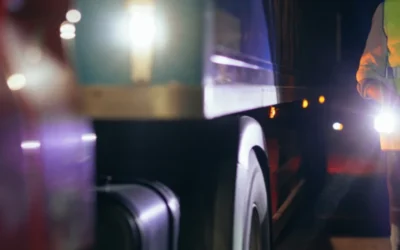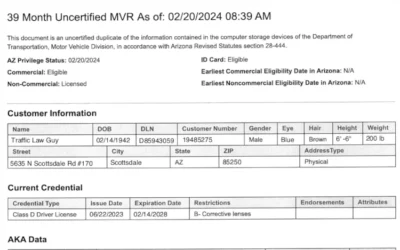Unlawful Flight in Arizona
A.R.S. 28-622.01
What is Unlawful Flight?
“Unlawful Flight from Law Enforcement” is defined as:
A driver of a motor vehicle who willfully flees or attempts to elude a pursuing official law enforcement vehicle is guilty of a class 5 felony if the law enforcement vehicle is either:
1. Being operated in the manner described in section 28-624, subsection C and is appropriately marked to show that it is an official law enforcement vehicle.
2. Unmarked and either of the following applies:
(a) The driver admits to knowing that the vehicle was an office law enforcement vehicle.
(b) Evidence shows that the driver knew that the vehicle was an official law enforcement vehicle.
CALL NOW OR UPLOAD YOUR TICKET
What unlawful flight means
Unlawful flight (also known as felony flight) is similar to, but more serious than, a failure to yield charge or a failure to comply charge. All three involve failing to do something that law enforcement wants done. The main difference is failure to yield and failure to comply do not involve an effort to escape from the police.
In our office, we generally see unlawful flight charges accompanied by some other misdemeanor traffic violation. If the police believe a driver is fleeing, the driver is typically traveling at a high rate of speed. This could result in an excessive speed charge. The police may believe the driver is fleeing because the driver is doing things like passing other cars in turn lanes or by crossing double yellow lines. This could result in a reckless driving charge. Similarly, if the driver is speeding, weaving in and out of traffic, and tailgating other drivers with the police following, an aggressive driving charge might follow.
What are the penalties for an unlawful flight conviction in Arizona?
Felony flight is a very serious charge. It is a class 5 felony. Felonies range from class 1, the most serious (like murder) to a class 6, the least serious. Potential consequences include:
-
- Prison. A.R.S. 13-702 covers sentencing for first time offenders and provides a range of 6 months to 2.5 years in prison for a first offense. The presumptive sentence is 1.5 years. This can be increased with aggravating factors or decreased with mitigating factors. See A.R.S. 13-701 for a list of aggravating and mitigating factors. A.R.S. 13-703 discussed increased sentencing for defendants with prior felony convictions.
- Fines.
- Up to 3 years Probation. See A.R.S. 13-902
- Restitution.
- Revocation of driver license.
- Loss of civil rights like the right to vote or own a firearm.
How to defend an unlawful flight charge
Attack the elements of the charge.
The prosecution must prove the elements of unlawful flight from law enforcement before a defendant can be found guilty:
-
- Did the defendant wilfully flee? Maybe the defendant did not know that law enforcement was pursuing him. Maybe the defendant was looking for a safe place to pull over.
- Did the defendant know it was an official law enforcement vehicle behind him? If the vehicle was unmarked, maybe the defendant did not know it was law enforcement.
- Was the law enforcement vehicle properly marked?
There may be other issues beyond the elements of the charge:
-
- Did law enforcement maintain visual contact on the defendant’s vehicle? If not, how does the prosecution know they have the right defendant?
- Was there some reason why the defendant appeared to flee law enforcement? Was there an emergency?
In the course of investigating the case, we look for any problems with the prosecution’s case.
Negotiation and Plea Agreements
There may be an opportunity to negotiate a favorable plea agreement with the prosecuting attorney. If an agreement can be reached, this gives the defendant some control over any sentence. This can be a good way to reduce the risk of leaving the sentence up to a judge. The facts of the case, the defendant’s criminal history (if any), and the defendant’s background all factor into plea negotiations.
If the charge is in Maricopa County, the case may go to Early Disposition Court. There, the defendant may be able to achieve a more favorable outcome than if the case were to go to trial.
Felony Flight Problem Solvers

David Enevoldsen, Partner
My favorite thing about being a criminal defense attorney is getting my client’s charges dismissed at trial. Driving on the beautiful Arizona highways is a close second.

Chris Rike, Partner
I love being a criminal traffic defense attorney because it marries two of my favorite things: cars and fighting for the rights of drivers.
Facing a charge of unlawful flight?
Email us below and we’ll reach out.
Latest Blog Posts
What Are CSA Points
CSA Points What are they, how do you get them, and how to avoid them.CSA PointsFirst, some definitions FMCSA FMCSA stands for the Federal Motor Carrier Safety Administration. This is a federal government agency responsible for overseeing motor carriers across the...
How To Get A Copy Of Your Driving Record In Arizona
How To Get A Copy Of Your Driving Record In Arizona Here's how to get a copy of your driving history from the Arizona Department of Transportation.What you are looking for Driver License Motor Vehicle RecordMake Sure You Get The Right Record There...



